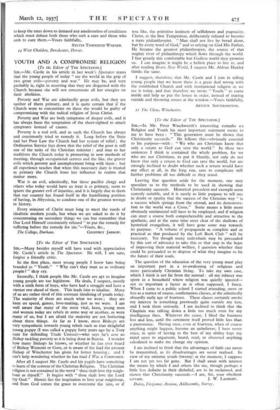[To the Editor of THE SPECTATOR.] Sia,—Many besides myself will
have read with appreciation Mr. Castle's article in The Spectator. He will, I am sure, forgive a friendly critic.
In-the first- place, most young people I know hate being branded as " Youth." " Why can't they treat us as ordinary people? " thty cry.
Secondly, I think people like Mr. Castle are apt to imagine young people are too highbrow. He deals, I suspect, mostly with a sixth form of boys, who have had a struggle and have a sterner one ahead of them. This leads him to idealise. Many of us are rather tired of this constant idealising of youth today. The majority of them are much what we were ; they are keen on speed, games, love-making, just as we were. I am well aware that many of the most vital, keen, young men and women today are rebels in some way or another, as were many of us, but I am afraid the majority are not bothering about these things. As far as I know, most Bishops are very sympathetic towards young rebels such as that delightful young puppy (I was called a puppy forty years ago by a Tory aunt for defending Trade Unions)—who says he's seen no Bishop tackling poverty as it is being done in Russia. I wonder how many Bishops he knows, or whether he has ever heard of Bishop Westcott or Gore, or is aware of the lead the present Bishop of Winchester has given for better housing ; and I can't help wondering whether he has read I Was a Communist.
After all I suspect Mr. Castle and his pupils have something to learn of the content of the Christian Religion. The Christian religion is not contained in the word " thou shalt love thy neigh- bour as thyself." It begins with " thou shalt love the Lord thy God." Herein lies the inspiration to love your neighbour, and from God comes the grace to overcome the sins, or if
you like, the primitive instincts of selfishness and pugnacity. Christ, at the first Temptation, deliberately refused to become a mere philanthropist. " Man shall not live by bread alone, but by every word of God," and so relying on God His Father, He became the greatest philanthropist, the source of that mighty river of philanthropy which flows through the world. I fear greatly this comfortable but Godless world they promise us. I can imagine it might be a hellish place to live in, and after reading Brave New World, I suspect Mr. Aldous Huxley thinks the same.
I suggest, therefore, that Mr. Castle and I join in telling young people that we know there is a great deal wrong with the established Church and with institutional religion as we see it today, and that therefore we invite " Youth " to come inside and help us put the house in order, instead of staying outside and throwing stones at the window.—Yours faithfully, rr The Close, Winchester.
ARTHUR SOUTHAMPTON.














































 Previous page
Previous page